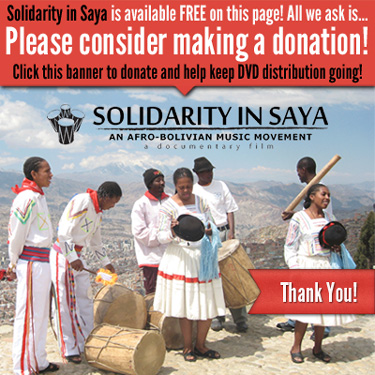Solidarity in Saya Blog
Interview with Afro-Bolivian activist & organizer, Caren Paola Yañez Inofuentes
Caren Paola Yañez Inofuentes was an active youth member of MOCUSABOL in La Paz when “Solidarity in Saya” was filmed.
I interviewed her in the Spring of 2012 to see what she had been up to since the filming of the documentary.
Maya: Do you still live in La Paz?
Paola: Yes, I am still living in La Paz.
M: Are you still involved with MOCUSABOL?
P: When you came to do the documentary, the Afro-Bolivian Center for Comprehensive and Community Development – CADIC, was in the process of forming under the leadership of Jorge Medina, to be the technical, political, and social branch of MOCUSABOL. This was a way to create a branch separate from the cultural, to influence the state in the Constituent Assembly (100% political vindication) So I had been an active part in the cultural activities of MOCUSABOL during that transition of forming CADIC and until the end of 2008.
From there I have dedicated myself only to the social and political demands of the Afro-Bolivian people, succeeding Jorge Medina as the Executive Director of CADIC in the period 2010 – 2011, when he became a member of the Parliament.
M: How is everything going with the organization?
P: This year, the president of MOCUSABOL is Jaime Flores, one of the activist youths since 2002 and the head of CADIC is Renan Paco, with MOCUSABOL in the cultural front and CADIC leading political processes and training Afro-Bolivian people nationwide.
M: How do you think the organization has changed over the past years that you’ve been involved?
P: As I explained earlier, it has changed considerably, from actors to the new struggles.
M: In your experience, how do you think the condition of Afro-Bolivians has changed over the past 6 years?
P: The recognition of the Afro-Bolivian people in the state constitution has enabled and guaranteed our participation in policy areas of the country; the arrival of Jorge Medina as a deputy on the Pluri-national Legislative Assembly, who has proposed and passed laws recognizing Saya [music] and Afro-Bolivian people as part of Bolivia’s cultural heritage; the declaration of September 23 as the day of Afro-Bolivian people, commemorating the abolition of slavery in Bolivia.
The Afro-Bolivian people are now visible and which allows us to hold the state to our specific rights.
For the first time this year, the population census will include a box of ethnicity for us.
Almost all Afro [-Bolivian] communities now have an organization and play Saya.
This among many other things.
M: What are some of the current goals/objectives of the Afro-Bolivian movement?
P: There are many. Now that we achieved constitutional recognition, now with the decentralized state through the autonomies, we seek to influence and make demands of each part of the Autonomous Departmental Statues and Municipal Organic Letters
Create an Afro-Bolivian people’s educational curriculum, agricultural insurance
On the cultural side, to innovate and get to know more about afros in other countries.
M:. Do you still have family living in the Yungas?
P: Still live there my uncles and some cousins and a grandmother
M: How are they doing? How has life in the villages changed in the past 5 years?
Bolivia has changed a lot, the condition in the villages has changed. We are guaranteed our participation, we are now familiar with our rights, despite all the problems and inconsistencies the process of change is moving forward with them and we Bolivians are rebuilding ourselves.
M: What else are you up to these days besides the SAYA organization?
P: I finished university, and I’ve been dedicated to formative processes of Afro-Bolivian women and activities with other organizations on the issue of rights of women, young and etc.
M: Do you have any plans or dreams for the future that you would like to share, either for your personal life or for the Afro-Bolivian movement?
P: The struggle of a people does not stop, there’s always more to do.



